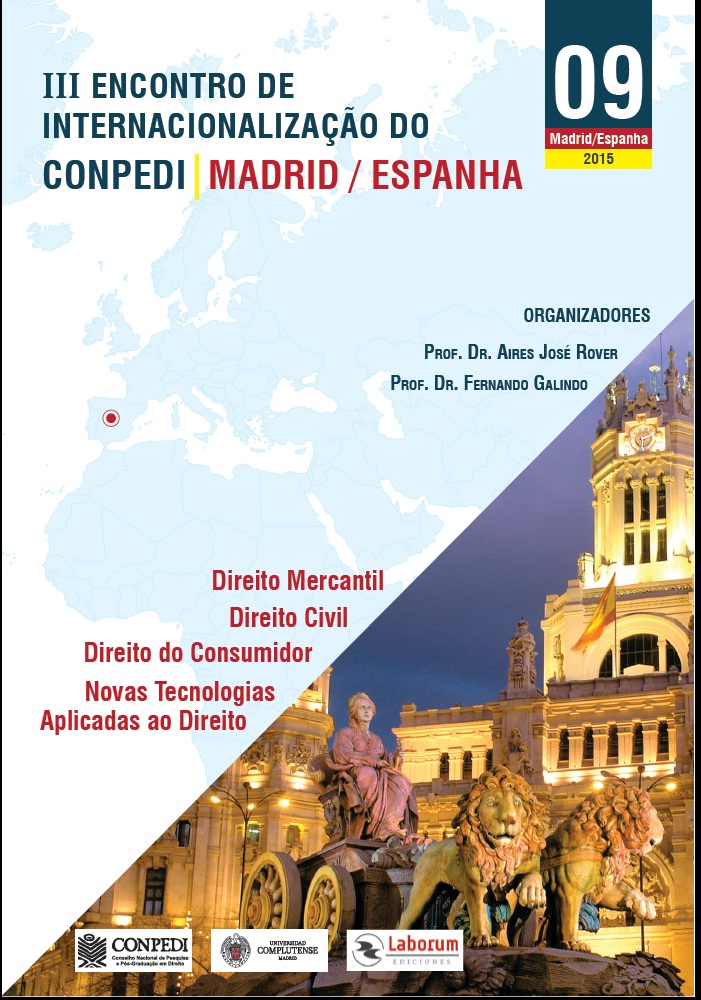A Unificação do Registro de Identidade Civil e a Proteção de Dados Pessoais no Brasil
Conteúdo do artigo principal
Resumo
Downloads
Detalhes do artigo
Autores que publicam nesta revista concordam com os seguintes termos:
O(s) autor(es) autoriza(m) a publicação do texto na da revista;
O(s) autor(es) garantem que a contribuição é original e inédita e que não está em processo de avaliação em outra(s) revista(s);
A revista não se responsabiliza pelas opiniões, idéias e conceitos emitidos nos textos, por serem de inteira responsabilidade de seu(s) autor(es);
É reservado aos editores o direito de proceder a ajustes textuais e de adequação às normas da publicação.
Autores mantém os direitos autorais e concedem à revista o direito de primeira publicação, com o trabalho simultaneamente licenciado sob a Licença Creative Commons Attribution que permite o compartilhamento do trabalho com reconhecimento da autoria e publicação inicial nesta revista.
Autores têm autorização para assumir contratos adicionais separadamente, para distribuição não-exclusiva da versão do trabalho publicada nesta revista (ex.: publicar em repositório institucional ou como capítulo de livro), com reconhecimento de autoria e publicação inicial nesta revista.
Autores têm permissão e são estimulados a publicar e distribuir seu trabalho online (ex.: em repositórios institucionais ou na sua página pessoal) a qualquer ponto antes ou durante o processo editorial, já que isso pode gerar alterações produtivas, bem como aumentar o impacto e a citação do trabalho publicado (Veja O Efeito do Acesso Livre) emhttp://opcit.eprints.org/oacitation-biblio.html
Referências
ALPA, Guido. Privacy e statuto dell’informazione. In: Banche dati telematica e diritti della persona, pp. 193-264.
AMARAL, Francisco. O direito civil na pós-modernidade. In: Revista Brasileira de Direito Comparado, n. 21, 2002.
BALDASSARRE, Antonio. Privacy e costituizione. l’esperienza statunitense. Roma: Bulzoni, 1974.
BARRETTO, Vicente. Problemas e perspectivas da bioética. In: Bioética no Brasil. RIOS, André (Org.) et al, Rio de Janeiro: Espaço e Tempo, 1999, p. 53-75.
BAUMAN, Zygmunt. Modernidade líquida. Rio de Janeiro: Zahar, 2001.
______. La società individualizzata. Bologna: Il Mulino, 2001.
______. Vigilância líquida. Rio de Janeiro: Zahar, 2014;
BECKER, Laércio. O direito na escola de frankfurt: balanço de uma desconfiança. In
BELL, Daniel. The coming of post-industrial society. New York: Basic Books, 1999.
BENNETT, Colin. Regulating privacy, data protection and public policy in europe and the united states. Ithaca: Cornell University Press, 1992.
BENTHAM, Jeremy. Teoria das penas legais. Campinas: Bookseller, 2002.
BENTHAM, Jeremy, MILL, John Stuart. Uma introdução aos princípios da moral e da legislação. São Paulo: Nova Cultural, 1989.
BLACKSTONE, William. Commentaries on the laws of england. Oxford: Clarendon Press, 1765-1769.
BLOUSTEIN, Edward. Privacy as an aspect of human dignity: an answer to dean prosser. In: 39 New York University Law Review 962 (1964).
BURKERT, Herbert. Privacy-data protection: a german/european perspective. In: Governance of Global Networks in the Light of Differing Local Values.
CAIRNCROSS, Frances. The death of distance. Boston: Harvard Press, 1997.
CARRINO, Agostino. Progresso e modernità. In: Il diritto nella società moderna. Napoli: ESI, 1995.
CARVALHO, Luis Gustavo Grandinetti de. Direito de informação e liberdade de expressão. Rio de Janeiro: Renovar, 1999.
CASTELLS, Manoel. The rise of the network society. Blackwell: Oxford, 1996 [ed.bras.: A sociedade em rede. Rio de Janeiro: Paz e Terra, 1999].
CATALA, Pierre. Ebauche d’une théorie juridique de l’information. In: Informatica e Diritto, ano IX, jan-apr. 1983, p. 15-31.
CELLA, José Renato Gaziero, VAZ, Ana Carolina. The prohibition of the right to anonymity on the autthoritarian brazilian constitucion ant its impact on social networks. In: XXV World Congress of Philosophy of Law and Social Philosophy - Law,
Science, Technology, 2011, Frankfurt am Main. Abstract Book. Frankfurt am Main: Normative Orders - Exzellenzcluster an der Goethe-Universität, 2011. p. 346-347.
COMPARATO, Fabio Konder. A democratização dos meios de comunicação de massa. In: Dossiê Comunicação, nº 48, dez./2000-fev./2001, pp. 6-17.
CONDORCET, Jean-Antoine-Nicolas de Caritat (marquis de). Esquisse d’un tableau historique des progrès de l’esprit humain. Paris: Masson & fils, 1822 [ed. bras.: Esboço de um quadro histórico dos progressos do espírito humano. Campinas: Unicamp,
1993].
______. Foucault. Lisboa: Vega, 1987.
______. A imagem-movimento: cinema. 2. ed. Lisboa: Assírio & Alvim, 2009.
______. A imagem-tempo. São Paulo: Brasiliense, 1990.
DELEUZE, Gilles, GUATTARI, Félix. O que é a filosofia? 2. ed. São Paulo: Ed. 34,1997.
DENNINGER, Erhard. Tutela ed attuazione del diritto nell’età tecnologica. In: Nuovi diritti dell’età tecnologica, cit., pp. 57-73.
DONEDA, D.C.M. Da privacidade à proteção de dados pessoais. Rio de Janeiro: Renovar, 2006.
______. O registro único de identidade civil entre a cidadania e o controle. In: FIRMINO,
R., BRUNO, F., KANASHIRO, M. Surveillance in latin america: vigilância, segurança e controle social. Curitiba: Editora Universitária Champagnat, 2009, ISSN 2175-9596, p. 246-255.
DUBY, Georges, ARIÈS, Phillipe. La vita private: dal feudalesimo al rinascmento. Bari: Laterza, 2001.
ECO, Umberto. Sei passeggiate nei boschi narrativi. Minalo: Bompiani, 1994.
FACHIN, Luiz Edson. Discriminação por motivos genéticos. In: Revista da Faculdade de Direito da UFPR, v. 36, 2001, pp. 209-219.
FACHIN, Luiz Edson, RUZYK, Carlos Eduardo. Direitos fundamentais, dignidade da pessoa humana e o novo código civil: uma análise crítica. In: Constituição, direitos fundamentais e direito privado. SARLET, Ingo Wolfgang (Org.), cit., p. 87-104.
FOUCAULT, Michel. Em defesa da sociedade: curso no collège de france (1975-1976). São Paulo: Martins Fontes, 1999.
______. História da sexualidade. Rio de Janeiro: Graal, 1985-2009.
______. Vigiar e punir: nascimento da prisão. 38. ed. Petrópolis: Vozes, 2010.
ORWELL, George. 1984. São Paulo: Companhia das Letras, 2009.





